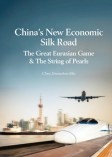Tenders Announced for Belgrade-Budapest High Speed Rail
The tender process for the controversial Belgrade-Budapest high speed rail for the Hungarian section has just been released by Hungarian State Railways with interested parties given until January 19 to submit their applications. The process has been controversial due to the conditions insisted upon by the European Union in Brussels, who have stated the tender process must confirm to EU protocols despite the fact it is not an EU funded project. This has upset the China Railway International Corporation and China Railway International Group who, between them, own the majority of the contracting entity, Chinese-Hungarian Railway Nonprofit Ltd. This is a subsidiary of Chinese Hungarian Railway, which was established in late 2016 based on an intergovernmental agreement between China and Hungary. Chinese Hungarian Railway is 85 percent owned by the Chinese state-owned China Railway International Corporation and China Railway International Group. Hungarian State Railways holds a 15 percent stake.
The winning bid will be selected 50 percent based on the quality of the technical bid and 50 percent on financial aspects, while the duration of the contract will be just over seven years. The cost of the upgrade in Hungary is expected to be around 550 billion Hungarian Forint (US$2.1 billion). China Exim Bank has already agreed to provide a twenty-year loan covering 85 percent of the project cost.
The controversy arises as the Chinese have built and funded the Belgrade line to the Hungarian border without incident, and on time and on budget. This is because the Serbian side is not part of the EU.
In addition, in 2016, China’s state-owned China Ocean Shipping (Cosco) acquired a majority stake in Piraeus Port in Greece, and China is also helping build a network of roads in non-EU countries, such as a link from Montenegro to Belgrade, which will help feed freight into Piraeus. The EU is concerned it is losing control of port operations and the ability to effectively police and manage developments within its own borders. Hence, the scrutiny on the tender process placed on the Hungarian rail section, which has held up the project, is much to the irritation of both China and the Hungarian Government.
Chris Devonshire-Ellis of Dezan Shira & Associates comments “Clearly the EU tender process when applied to cross-border infrastructure development projects is insufficient when it comes to handling non-EU funding and non-EU participants. A separate protocol needs to be drafted to allow the input of non-EU financiers and contractors to at least participate in these types of operations. It should not be the position of Brussels to interfere and delay much needed and desired infrastructure in the name of transparency when it is not their money or even development plan. A compromise needs to be reached. Asking for Chinese investment yet at the same time putting such barriers in the way shows an internal conflict about dealing with non-EU investments. It makes it hard to persuade the Chinese to open up their markets when the EU imposes such scrutiny on the Chinese.”
About Us
Silk Road Briefing is produced and written by Dezan Shira & Associates. The firm provides governments and corporate businesses worldwide with strategic, legal, tax and operational advisory services to their SMEs and MNCs investing throughout Eurasia and has 28 offices across China, India, Russia and the ASEAN nations, and partner firms in Central Asia. We have specific and long term experience in China and the OBOR countries. For assistance with OBOR related issues, please contact the firm at silkroad@dezshira.com or visit the practice at www.dezshira.com
 Related Reading:
Related Reading:
![]() EU Investment Tender Compliance Regulations Hinder China At Budapest CEEC Gathering
EU Investment Tender Compliance Regulations Hinder China At Budapest CEEC Gathering
Silk Road and OBOR Business Intelligence
Dezan Shira & Associates´ Silk Road and OBOR investment brochure offers an introduction to the region and an overview of the services provided by the firm. It is Dezan Shira´s mission to guide investors through the Silk Road´s complex regulatory environment and assist with all aspects of establishing, maintaining and growing business operations in the region.
China’s New Economic Silk Road
This unique and currently only available study into the proposed Silk Road Economic Belt examines the institutional, financial and infrastructure projects that are currently underway and in the planning stage across the entire region. Covering over 60 countries, this book explores the regional reforms, potential problems, opportunities and longer term impact that the Silk Road will have upon Asia, Africa, the Middle East, Europe and the United States.







